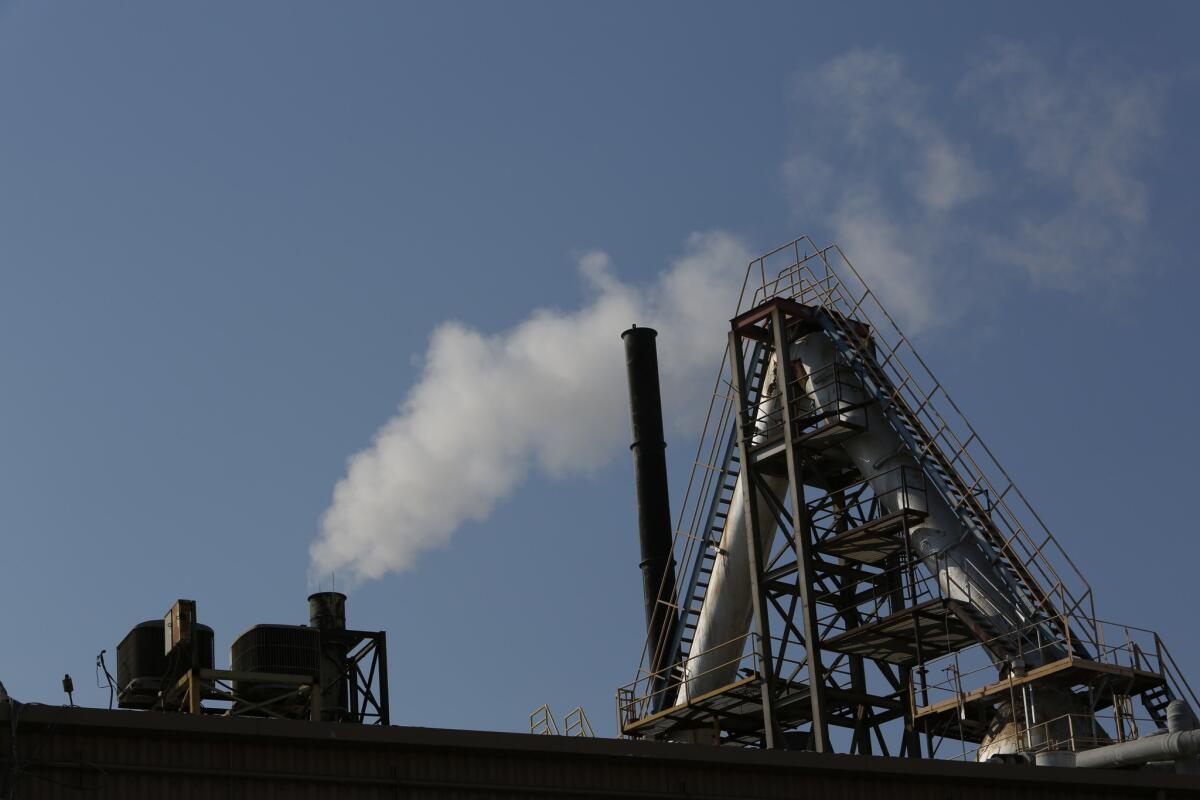Exide ordered to cut production after lead emissions exceed standards

- Share via
Air quality regulators have ordered the embattled Vernon battery recycler Exide Technologies to cut production after an air monitor revealed lead emissions had exceeded health standards over a 30-day period.
The excessive lead emissions occurred even as elected officials and community members across southeast Los Angeles have been calling for the plant’s closure amid an outcry over high arsenic emissions.
Last week, in an unprecedented move, state and Los Angeles County officials unveiled a plan to make blood tests for lead available to a quarter of a million people who might be affected by the emissions.
The announcement Wednesday of Exide’s latest infraction stunned local activists and officials.
“Here’s my reaction: Oh my God,” said Msgr. John Moretta of Resurrection Catholic Church in Boyle Heights, where parishioners have expressed health concerns about the plant for years and have called for its permanent shutdown.
“After all the guarantees the community was given, now this?” Moretta said. “It’s just one thing after another. Maybe this is a sign that the community is correct and it’s time to close it.”
An Exide company spokeswoman did not respond to requests for comment.
Air district officials said Exide at first disputed that the high lead readings resulted from their operations, attributing them to a nearby factory. But eventually Exide agreed to cut production by 15%.
Under the South Coast Air Quality Management District’s rules, Exide’s lead emissions cannot cause the outdoor air concentration of lead to exceed 0.15 micrograms per cubic meter based on a 30-day average. On Sept. 9, an air monitor on Exide’s property picked up a reading of 1.017 micrograms per cubic meter, resulting in a 30-day average of 0.17.
In addition to cutting production, the company must test the air around its plant for lead every day for the next two months, instead of every third day. If lead emissions do not improve, officials said, they can take further steps to limit Exide’s operations.
Barry Wallerstein, the air district’s executive officer, stressed that even with the latest spike in lead emissions, the air in the area meets the federal health standard. But the production cut was required to ensure that Exide’s emissions did not cause Los Angeles’ air to exceed such limits.
A few years ago, emissions from Exide caused the entire Los Angeles region to be “out of compliance with federal clean air standards that existed at the time,” Wallerstein said.
Exide’s lead emissions have plummeted since 2008, Wallerstein said, but he expressed concern about the latest spike, which comes as it is the subject of intense public and news media scrutiny and as inspectors are frequently checking on the plant.
“And yet we seem to have one thing happen after another at the facility…. It’s puzzling, but it’s something we’re carefully taking note of,” he said.
Some critics of the plant said they believe that cutting production will not be sufficient.
“Exide has been exceeding lead emissions standards for over a decade. They’ve exceeded arsenic standards as well, and now it’s lead again,” said Bill Gallegos, the executive director of Communities for a Better Environment, an environmental justice group.
Community concern about Exide has been mounting since spring, when The Times reported that the air district had found that elevated arsenic emissions from the plant had increased the cancer risk for more than 110,000 people.
The plant has also been cited repeatedly by the air district and the state Department of Toxic Substances Control for discharging potentially harmful quantities of lead.
After the air district first revealed the elevated cancer risk from arsenic, officials from the state toxics department moved to temporarily suspend plant operations. But Exide appealed in Los Angeles County Superior Court, arguing that the plant did not pose “an imminent and substantial” danger to the public.
After a July 2 hearing, Judge Luis Lavin sided with the company. “The Department’s avalanche of conclusions, speculation and innuendo are not a substitute for evidence,” he said in a written order that allowed the plant to resume operation pending an administrative law hearing that began in June but has not yet been wrapped up.
On Monday, however, Lavin signaled that he might lift his stay of the state’s April closure order, which would allow its reinstatement. The judge ordered the company back into his court Oct. 15 to show cause why he should not lift his stay “based on Exide’s failure to complete the administrative hearing in a timely fashion.”
Stephen J. O’Neil, Exide’s attorney, declined to comment.
More to Read
Sign up for Essential California
The most important California stories and recommendations in your inbox every morning.
You may occasionally receive promotional content from the Los Angeles Times.











